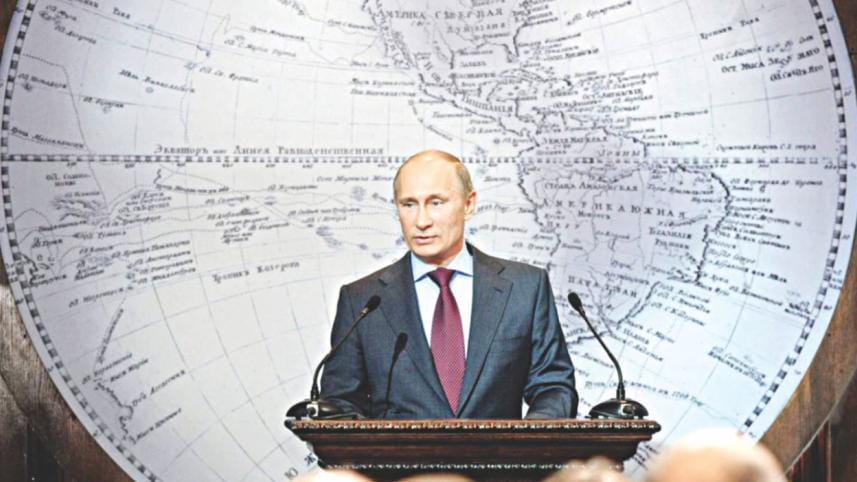Where is Putin leading Russia?

When Vladimir Putin was inaugurated in 2000 as president for his first term in office, he inherited a Russia shrunken by the collapse of the Soviet Union with an economy left in disorder by President Yeltsin. State assets had been seized by a new class of oligarchs while ordinary Russians found pensions unpaid.
Using a tight circle of former KGB and St Petersburg colleagues, Putin worked successfully to restore order and control, including the jailing of oil tycoon Khodorkovsky in 2003. The big rise in global oil prices boosted revenues, and in March 2004, he won a second term. But Ukraine's 2004-5 Orange Revolution came as a great shock. Putin viewed it as a western plot to extend EU and NATO's hold on eastern European countries formerly part of the USSR. The hugely expensive 2014 Winter Olympics at Sochi, which was selected as the host city in 2007, was a defiant demonstration of Russia's restored prestige under Putin's strong leadership.
From 2008, debarred constitutionally from a third consecutive term in presidency, Putin became prime minister, with Medvedev as president. However, Putin retained real power with an emerging middle class and newly-found confidence in relation to with the West.
But a darker era emerged in Russia's relations with the West when a short war by Russia with Georgia in August 2008 ended, when the USA threatened military intervention, but still left Abkhazia and South Ossetia under Russian control.
When Putin again ran for president, he was faced with a new youthful and city-centred opposition, and the 2011 election was marred by fraud and violence. The global financial crisis and subsequently drastic fall in prices for oil exports collapsed Russian government revenues. From 2014, the economy entered years of recession, posing a threat to Putin's authority and image.
His response was putting greater stress on nationalism and orthodoxy to defend Russia. The March 2014 annexation of Crimea was domestically popular. Western sanctions and support for Ukraine against the covert Russian take-over of the Donbas region were portrayed as further evidence of hostility from the West which was blamed for fall in Russian living standards.
The year 2015 was notable for the Moscow assassination of opposition leader Boris Nemtsov and military intervention in Syria "to destroy terrorist groups" and save the brutal Assad regime.
Now in 2018, after the barring of Alexei Navalny from running, we saw Putin being elected virtually unopposed as president (until 2024) and boasting of Russia's nuclear power. Oil prices have recovered. By 2017 the Russian economy had moved back into 1.2 percent growth. What can now be expected of this huge state stretching over 11 time-zones? Where will Putin lead Russia?
There are many issues. The recent mass expulsion of Russian intelligence officers by over 24 countries is a reaction to years of Russian state assassinations, trolling and soft crypto warfare. Western hostility has become real and the EU is working to reduce its degree of reliance on Russian gas.
Still, Russia remains formidable with its nuclear power and a permanent membership of the UN Security Council. After years of recession, it is now in a good financial shape, with low debt. Its armed forces have been re-strengthened and it has a satisfactory scientific base. The government maintains strong central control and a new, younger generation is beginning to take over as regional governors and top officials.
On the other hand, it has become only a regional power, unlike the former USSR, and is increasingly overshadowed by China. Russia's population is only 140 million and is ageing. Health and social services are poor and the economy is not only subject to cronyism and massive corruption but is still far too dependent on oil and gas exports.
This overdependence on oil and gas is a key factor. The EU still takes 35 percent of its gas from Russia and in the short term that could even increase. From 2019, new pipelines will enable Russia to supply up to 10 percent of China's gas imports. But global LNG and LPG markets are growing fast, and in any case, how important will fossil fuels be in 30 years' time?
Russia needs to diversify its economy but Putin and the powerful elite around him show little sign of urgency and vision. In any case, corruption and western sanctions will continue to deter foreign investments and technology. There is no sign of anything comparable with Saudi Arabia where Crown Prince Salman is undertaking a series of social and economic revolutionary reforms for a modern, diversified economy. Some critics are beginning to compare Putin with Brezhnev, under whom the USSR economy stagnated.
Nor, as already noted in relation to the intelligence expulsions, are things less problematic in the sphere of foreign affairs, on which Putin has progressively tended to focus. The low-level war with Ukraine continues with no sign of an end. In Crimea, the Tartar minority is unhappy, and reworking the economy and utilities, including a long bridge to provide a direct link, is proving expensive. Countries of Central Asia, once within the USSR and some still with Russian minorities, are increasingly under Chinese influence as the massive BRI loans and infrastructural projects develop.
In Syria, Russia's heavy air force intervention has maintained the Assad regime and avoided any loss of the only Russian military base on the Mediterranean, but has been expensive and has also seen Russian casualties. An announced withdrawal has not so far proved possible and it is difficult to see any lasting Russian advantage gained. In the reconstruction of Syria, when it at last takes place, well-financed Chinese firms will gain far more contracts than the Russians will.
A new Russian generation is emerging which does not wish for isolation and relative stagnation. But the expulsion of Russian intelligence personnel, expensive war efforts in Syria, and China's rising influence make the youth population feel cornered.
Selina Mohsin is a former ambassador.




Comments